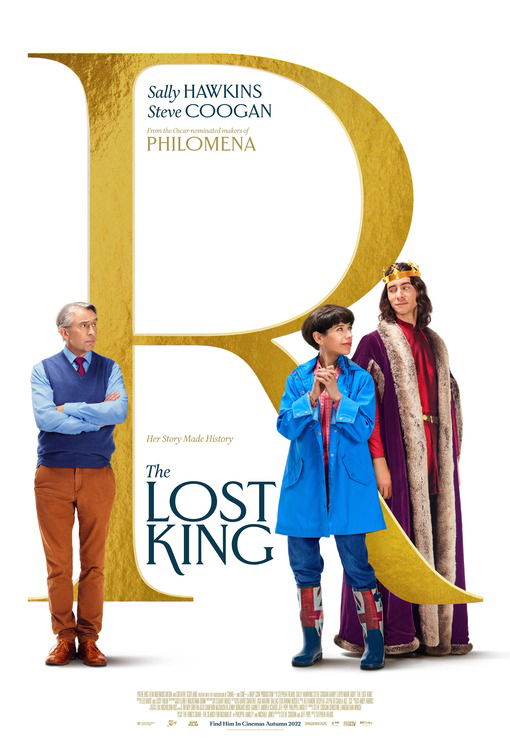“Searching for Truth Can Become a Personal Adventure”

| None | Light | Moderate | Heavy | |
|---|---|---|---|---|
| Language | ||||
| Violence | ||||
| Sex | ||||
| Nudity |
What You Need To Know:
THE LOST KING has a difficult time deciding what it wants to be in the beginning. Thus, the second half is more compelling than the first. It tells an exciting, inspiring story about a woman’s tenacious devotion and perseverance in pursuing truth. Also, the heroine gets help from her family. However, she and her ex-husband remain divorced and are only living together for the sake of their children. THE LOST KING contains several obscenities and some other brief lewd dialogue. So, MOVIEGUIDE® advises caution for older children.
Content:
The overall worldview is a mix of biblical values and postmodern humanism, with some Romantic elements, where a divorced husband and wife living together in the interests of their children eventually find some redemptive support in each other when the wife goes on a quest for historical truth regarding the British king Richard III after she sees Shakespeare’s famous play, plus heroine imagines talking to an apparition of an historical figure
Six obscenities (including one “f” word)
There is some staged sword fighting as people watch a theatrical play
There is some lewd dialogue and a divorced married couple kiss but decide not to have marital relations
No nudity
Brief social drinking
No smoking or drugs;
A divorced husband and wife live together for the sake of their children, though it seems they aren’t engaging in marital relations.
More Detail:
Philippa Langley is an unhappy, divorced mother of two. She suffers from an occasionally debilitating case of chronic fatigue syndrome. Also, her job is dull and exasperating, and her live-in husband is little help with any of these issues.
Taking her son to a school play of Shakespeare’s RICHARD III, Philippa becomes enthralled by the life story of the play’s title character. She’s drawn to the character of Richard, feeling that her life and his are in some ways much alike in that they are both misunderstood people. She begins to challenge the conventional wisdom on Richard, which sees him as a villain. Reading deeply on the subject of the king, she questions the narrative of the monarch given by most historical experts. Eventually, she comes to believe that this narrative is nothing more than slanderous 500-year-old Tudor propaganda written by the victors of the Battle of Bosworth Field on August 22, 1485. About 108 years or so later, playwright William Shakespeare promoted this allegedly false version in his play, because Queen Elizabeth I, the reigning Tudor monarch of England, was his patron.
Philippa convinces some powerful entities to support her cause. She makes an attempt to find the last resting place of the much maligned king. Will her research in pursuit of the truth pay off in the end?
THE LOST KING has a difficult time deciding what it wants to be in the beginning. Thus, the second half is more compelling than the first. If it’s trying to be a drama, it seems a half-hearted one till the second half. If it’s trying to be comedic, there are few laughs to be found. What it does do well, however, is in portraying the protagonist’s pursuit of an interest, which turns into a bit of an obsession The heroine’s perseverance in her quest to discover the truth about an English monarch she feels has been grievously wronged is inspiring. The movie includes scenes of her conversing with an apparition of Richard. While this is sometimes psychologically troubling, they are a brilliant way of showing how important Philippa’s quest has become to her.
Philippa’s devotion to her cause is what really drives THE LOST KING. Her relationship with Richard III is palpable in that she feels the rejection she imagines he would feel if he were able to see what has been said about him. Her tenacity in taking on the entrenched position of the historical community regarding Richard, and eventually forcing a paradigm shift, is exciting. Also, the movie’s ending is fairly uplifting in that it shows the heroine getting the credit she deserves. The movie also convincingly asserts that people often don’t see the pivotal roles other people play in their lives.
The overall worldview in THE LOST KING is a mix of postmodern humanism and biblical values. The movie begins with a negative view of family. Philippa and her husband are divorced but living together, largely for their children’s sake. Then, when they begin to care for each other again, a kiss causes her to ask, “Do we really want to go down that road again?” Her husband then replies, “Probably not.” Thankfully, though, this negative view of marriage and family undergoes a paradigm shift nearly as big as the historians’ view of Richard III when Philippa’s family gets behind her work to cheer her onward in the pursuit of truth. This doesn’t make up for the fact, of course, that Philippa and her husband remain divorced and are only living together for the sake of their children.
To the filmmakers’ credit, however, THE LOST KING is refreshing in that it’s largely free of objectionable problematic content other than several obscenities and other brief lewd language. MOVIEGUIDE® advises caution for older children.


 - Content:
- Content: 




